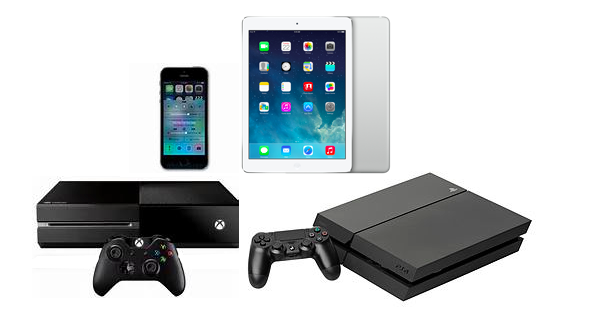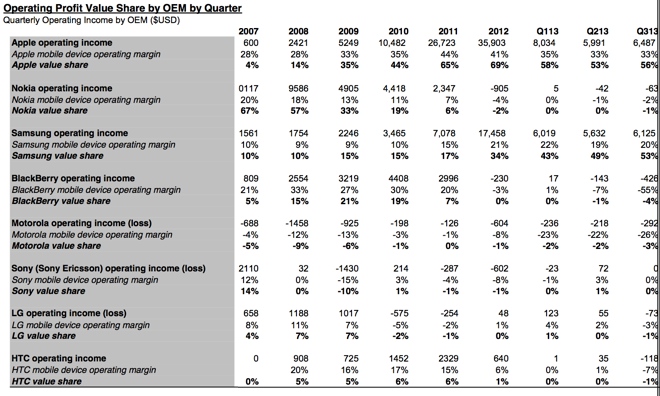This holiday season, shoppers voting with their dollars will shake out winners (and likely some losers) in the vast market for consumer electronics. However, fierce competition is prompting some efforts to twist market statistics into bizarre distortions of fallacy on behalf of the losers.
Good time to be a gamer
There currently doesn't seem to be much interest in inventing distortions in the console video game market, where Microsoft's new Xbox One and Sony's equally new PlayStation 4 have just gone on sale.
Despite previous generations of the two company's platforms having rather fiercely duked it out in the market before, this season the competitive spirit seems a bit more jovial than cutthroat. On Twitter, the two firms recently passed complements and fraternal well wishing back and forth.
@PlayStation @Microsoft Thanks! It's been a #GreatWeektoBeaGamer
— Xbox (@Xbox) November 22, 2013There appears to be room for both companies to sell lots of new gear. Over the last 7 or 8 years of the previous generation systems, the two firms sold roughly equal numbers of their consoles, with current cumulative totals of each having both reached 80 million units in the last month.
How big is the total market for video games? That depends on whether one can include the more family oriented Nintendo Wii U, or a number of other consoles ranging from what are essentially toys to previous generation devices that sell for far cheaper but no longer get the big new game releases reserved for premium consoles where enthusiast customers are more like to spend their money.
Back in 2006, when I contrasted Microsoft's strategy of selling only its then-new Xbox 360 with Sony's efforts to continue selling its older PS 2 at a discount alongside its new, higher end PS 3, the very notion of comparing sales numbers of two different generations of consoles was met with contempt from Xbox fans.
Such rules do not apply to Apple
The precision in accounting rules required to be taken seriously by customers in the video game console market stands in stark contrast to the way the mainstream media, and even the tech blogs, are reporting sales of iPhones and iPads, fueled by statistics crafted by Gartner, IDC and Strategy Analytics.
It's now impossible to mention the iPhone without pointing out that 81 percent of all smartphones now run Android, or reference the iPad without also noting that a similar majority of tablets involve Android.
However, Average Selling Prices of smartphones, premium phablets and iPhones make it very clear that there is a far greater difference between what Apple is selling (at an average of $635, more than what the high end PS3 cost when brand new) and what Samsung, LG and Motorola are trying to sell in their high end flagship offerings (at an ASP of $443, closer to the price of the original Xbox 360 without its ill-fated HD-DVD drive).
Further down the road, among the very low end devices that are still categorized as being a smartphone, vendors can only fetch an ASP of less than $215, on par with a long-in-the-tooth PS2 in 2005 or an even cheaper retro Atari package or children's game that has little relevance to the premium console market.
Dumping all these products into a single category would provide a very worthless picture of how well any of the market participants are performing, muddling vendors that are attracting high end customers to a premium experience in among discount sales of largely irrelevant devices that may ship in volume, but have no real impact on the market in terms of what platforms developers will target for exclusive, premium gaming software.
The other huge difference between Apple's iPhone sales and the last batch of video game consoles is that Apple is earning industry-leading profit margins, while both Microsoft and Sony were selling hardware at a loss just to create an installed base. Cheaper video games, including Nintendo's Wii systems, were sold at a profit from the start. Conversely, cheaper Android smartphones are not profitable enough to keep the majority of vendors from losing money (below).
iPad market now larger than Microsoft Windows in 1998
Tablet metrics from Strategy Analytics present a similarly obscured window into the iPad market. Apple's critics love to cite these numbers, but comparing the iPad's former "market share" in 2010 with the current numbers being advertised today create a false impression of the direction and trajectory of the market.
"Android has seized the tablet market with a crushing force" in China. AAPL share drops to 28% from 49% yr ago. http://t.co/mT6OabV49L
— Dan Lyons (@realdanlyons) August 21, 2013Apple doesn't now have just a quarter of the tablet clout it had just three years ago, as such "market share" figures try to suggest. The ecosystem for tablet apps continues to be targeted almost exclusively at iPads, even as iPad sales, and therefore app demand, have ballooned. Apple has now sold more iPads to date than Microsoft and Sony have sold of their leading last generation game consoles over a period twice as long
Apple has now sold more iPads to date than Microsoft and Sony have sold of their leading last generation game consoles over a period twice as long (170 million iPads in four years, versus 160 million Xbox 360 and PlayStation 3 units over 8 years).
They are not in the same market, but that does illustrate the size of Apple's premium tablet platform, clearly unmatched by large volumes of $40-100 Android tablet shipments.
Additionally, enterprise and education markets report iPad adoption rates that are above 90 percent, higher than all versions of Windows were a similar four years after the launch of Windows 95.
Microsoft's share of the 1998 PC OS market was reported to be 86.7 percent, according to a CNET report of IDC figures. In a market of 89 million units, that gave Microsoft software licensing on about 77.1 million machines.
Apple sold 71 million iPads in its fiscal 2013 ending in September, making its sales of iPads today nearly as large as Microsoft's total sales of Windows licenses in 1998 (and possibly larger for the calendar year, if holiday quarterly iPad sales beat last year's by 6 million units).
It's also notable that back then, Microsoft was selling four different OS versions, ranging from the DOS-hosted Windows 3.11, 95 and 98 to Windows NT. Apple ships iPads with one OS version, and supports iOS 7 on every iPad sold after the original model.
One can argue that Apple shouldn't have such dominant sales, or advocate against it or for rivals, but a false portrayal of reality in the market does not achieve those goals. If IBM had paid a market research company to advertise market metrics that falsely portrayed OS/2 as having made serious progress against Windows in the mid 90s when it clearly wasn't, such a distortion of reality wouldn't have turned IBM's OS/2 fortunes around.
Or, alternatively, if market researchers back in the late 90s had traveled the world looking for shipments of electronic devices ranging from calculators to Palm Pilots, anything with an "identifiable processor," it would have been easy to publish statistics portraying Microsoft's "market share" as perilously slipping in the global market for "digital devices."
However, such nonsense numbers wouldn't have had any impact on the undeniable fact that Microsoft still dominated the PC computing landscape, the same way Apple dominated music playback almost ten years ago and the way iPad is dominating mobile computing today.
 Daniel Eran Dilger
Daniel Eran Dilger








-m.jpg)






 Marko Zivkovic
Marko Zivkovic
 Christine McKee
Christine McKee
 Andrew Orr
Andrew Orr
 Andrew O'Hara
Andrew O'Hara
 William Gallagher
William Gallagher

 Mike Wuerthele
Mike Wuerthele
 Bon Adamson
Bon Adamson




-m.jpg)



43 Comments
But really, who cares? As long as Apple is making enough money on the devices to keep making them and improving them, I don't care how many people use them vs. Android. This is about investment, not technology. There are lots of other investments to put your money in, so just move on to something less volatile.
Thanks for this article. I would argue that the misunderstanding of Apple combined with a willful manipulation if the data is creating an ideal situation to buy the stock. I'd rather buy the successful stock all the idiots are proclaiming is dying rather than the hot stock of a company that's actually not making any money. No stock escapes reality forever no matter how hard many people are working to mislead.
Man bites dog stories will always be the bread and butter of the popular press–especially the press that wants to be MORE popular. Thanks, DED, good analogy.
The purpose behind the numbers being pushed is to create a market which doesn't yet exist. Most people want to go with the herd as consumers, and most developers do also. Where the herd is is where you can be confident that you're not making a mistake. As has been noted in the restaurant business, if you want to know which restaurant to eat at, look for the restaurant with long lines. Apple certainly gets the benefit of long lines -- you don't think long lines at an Apple store is an accident do you?
So the Playstation 4 is broken on launch day (and wobbles when set on a desk), the Xbox One will RROD just like every other Microsoft product, but when it does work it will be visually and audibly monitoring you 24/7 due to the always-on, always-plugged in Kinect…
And Apple’s supposed to be worried? With either an iPhone or iPod touch in every pocket? When the A7 is three-quarters of the way to matching the capabilities of last generation’s consoles and the A8, next year, will be, what, a quarter of the way to this gen’s? In two years’ time, Apple devices should be able to put out more graphically intensive games than either of these consoles, but the people who buy the latter will be stuck with them for at least five more years, if we listen to their respective companies!